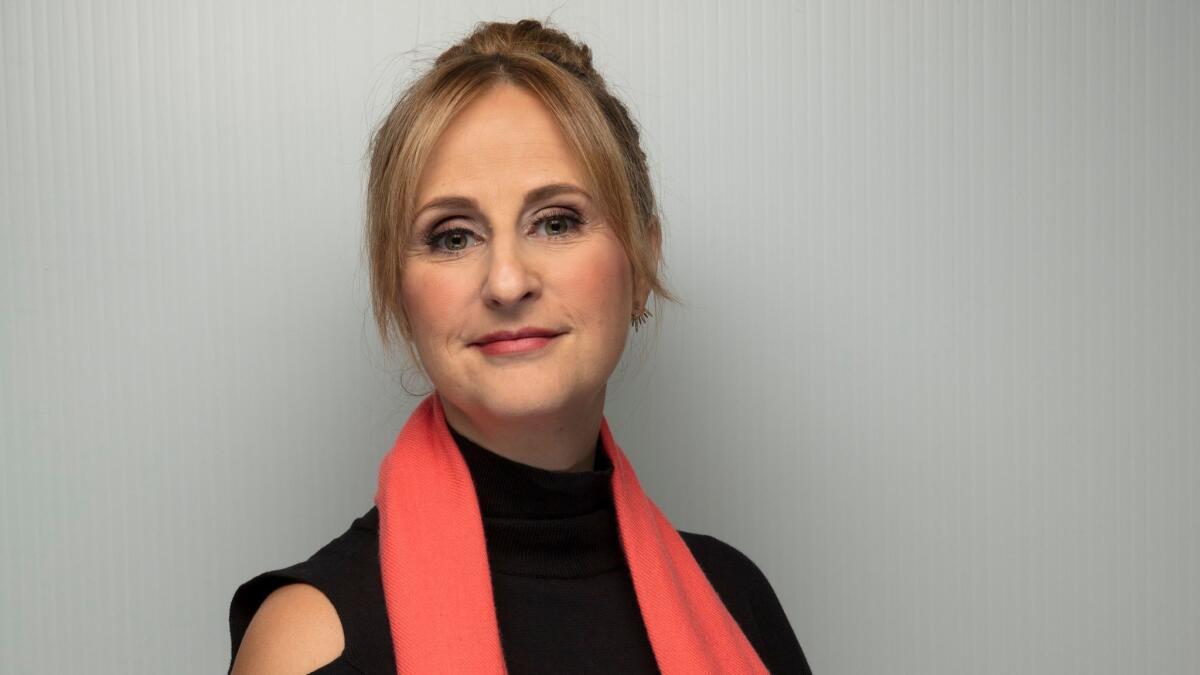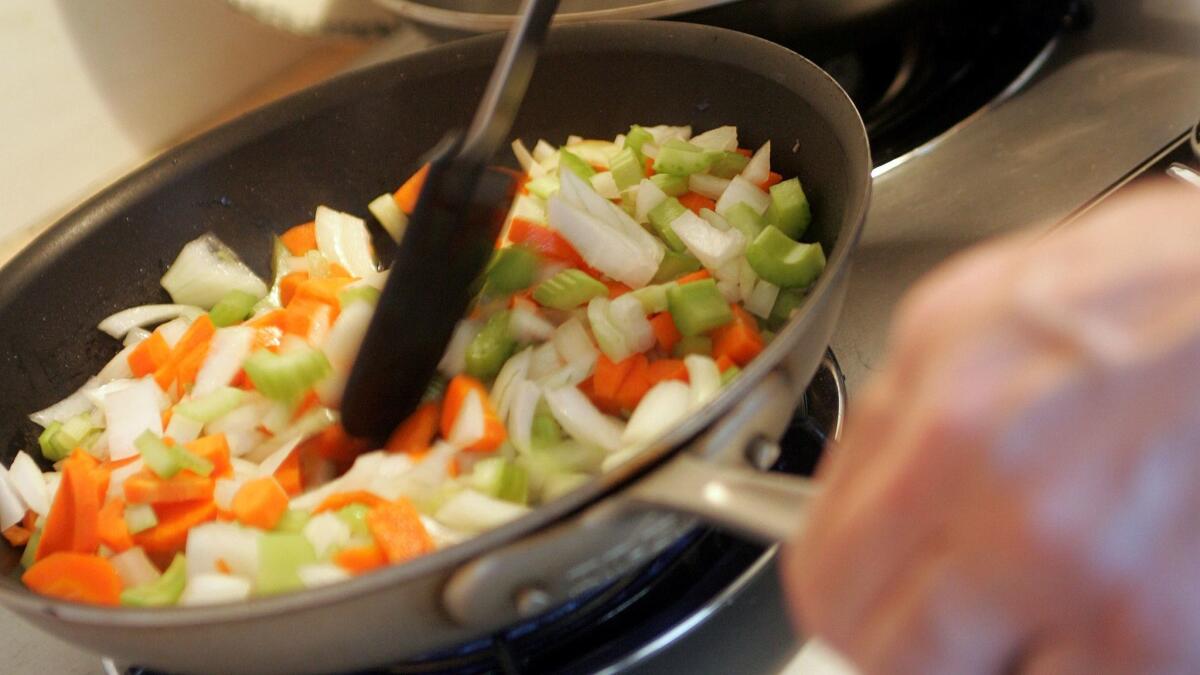Should we be scared of Teflon? A new Sundance documentary investigates

- Share via
First she took on BPA. Then sugar. Now, documentary filmmaker Stephanie Soechtig is going after Teflon — the chemical that coats so many of our nonstick pans.
In her latest expose, “The Devil We Know” — which premiered at the Sundance Film Festival this week — Soechtig investigates how harmful Teflon is to our health. First introduced to consumers in 1945 by the corporation DuPont, Teflon was marketed as something that could make life easier. “It was supposed to liberate women from the kitchen,” Soechtig explains. “ ‘Look, you don’t have to stay scrubbing your pans all day long!’ ”
Teflon would go on to become so ubiquitous that as the documentarian discovered, the chemical can now be found in the bloodstream of 99.7% of Americans. So why is that a problem? Just look at Parkersburg, W.Va., the city where DuPont was headquartered. As Soechtig explores in the film, hundreds of local residents who were exposed to the chemical — also referred to as C-8, or PFOA — through their drinking water became extremely ill, suffering from cancer, facial deformities at birth and immunodeficiency. In February, the corporation was forced to pay $670.7 million to 3,550 plaintiffs whose water had been contaminated, though it has never admitted to any wrongdoing. (The corporation, which is now owned by Dow Chemical Co., did not respond to a request for comment.)
Despite the massive class action settlement, perfluorinated chemicals like C-8 continue to turn up in our cookware — just with different names. Soechtig is no stranger to this kind of controversy: In 2009, her film “Tapped” looked into our potentially dangerous plastic water bottles, and 2014’s “Fed Up” researched the link between the processed food industry and obesity. In May, a judge dismissed a $12-million lawsuit aimed at the filmmaker and producer Katie Couric over 2016’s Sandy Hook documentary, “Under the Gun,” in which the Virginia Citizens Defense League felt they were depicted unfairly while discussing gun control.
A few hours before “The Devil We Know” was unveiled to festivalgoers, we spoke to Soechtig about her latest film and why she feels we need to be more mindful about what we put into our bodies.
OK, so first things first: What is Teflon?
If it’s nonstick, it’s Teflon. There’s a whole category of chemicals called perfluorinated chemicals, and C8 is just one of those perfluorinated chemicals. But if you just want to eyeball it, if it’s waterproof, stain-proof or nonstick, it’s got one of these chemicals that you should be avoiding. And it’s not just in pans. It’s in the carpets your kids are crawling on. It’s in fast-food wrappers. It’s in your dental floss. Because there is nobody out there saying, “These things have to meet a safety criteria,” they’re allowed legally into the marketplace. And I just find that infuriating. I’ve always been like that, even since high school.
What do you mean?
I really don’t like being a victim of corporations or a lack of regulations. So that always gets me excited — “Do you know that this is happening to you, it’s perfectly legal and if we just all spoke up, things could change?” I like calling out when corporations or the government are screwing us.

How did you become interested in looking into Teflon?
I read some articles about it, and to be honest, I’d been looking for a way to tell the story of chemical contamination ever since my first film, “Tapped.” And that’s when I learned that killer chemicals are considered innocent until proven guilty — and the onus on proving them guilty is on citizens.
So the two things that really interested me was that this chemical was in 99.7% of our bloodstreams and that it was such a personal story. I love the idea of inspiring people to take action. I feel like we’re all so complacent and we always think somebody else is going to solve the problem, or that we couldn’t do anything anyway. I was hoping it could be a hopeful story instead of just doom and gloom.
But it is overwhelming, thinking about all of the products out there that are potentially harmful to us.
I do think people get so overwhelmed that they just throw their hands up, but you can’t for your children’s sake. We have an obligation to them. The people of Parkersburg can’t throw their hands up. Listen, you can’t take on everything that’s out there. You have to pick what you’re passionate about. But I think when it comes to things you’re putting on your body and eating and consuming, that should be a top priority. It really should be a top priority of our government. There would only need to be a short yet concerted effort to be made by people in order for there to be change. When you look at the effect of “Blackfish” or “An Inconvenient Truth” — how quickly the corporations responded. We vote every day with the products we buy.
Right, and what’s interesting is that this is out there — the DuPont settlement was all over the news. Do you think we’re turning a blind eye to the issue?
I do think that there’s a pervasive idea that if it’s on the shelf, it’s safe. I think people believe that someone is looking out for us. This is America, this water is safe if I turn it on — this cream is safe if I put it on my skin. I think people just are blown away when they find out that no, nobody is looking out for us. The chemical regulation in this country is abysmal.
Have you always been really cautious about what you consume?
I’m hyper-aware of it. I was pregnant while we were making this film, and somebody asked me, “Did it affect everything you did?” But not really, because since “Tapped,” I’ve been using stainless steel bottles and cooking on cast iron pans. So yeah, I’m that girl. I’ll tag my friends in pictures and be like, “That Nalgene bottle you’re using probably has BPA in it.” I’m a real good time.
Is this truly a problem outside of Parkersburg, where the chemical was being dumped into the local water system in large quantities?
C-8 has been detected in 6 million people’s water systems. It’s in Milan, the Netherlands, China. They’re finding this in polar bears. This is not a story about Parkersburg. This is a story about you and I.
OK, so if one was interested in avoiding nonstick chemicals, what’s the plan of action?
If you’re out shopping and you don’t know what to buy anymore, a great resource is the Environmental Working Group. My family, personally, we’ve switched to cast iron pans. I always just thought of Teflon as pans, which is so annoying and misleading. On top of that, if you’re on the Williams-Sonoma website, everything says “PFOA free,” but there are thousands of other replacement chemicals.
If we’re not demanding change, no one is going to change things. If we say we’re not going to buy this product anymore, they’ll change it. They’re going to meet their customers’ demand. It means a tiny bit of discomfort: Maybe your eggs are going to stick to your pan for a little bit. But we need to send this message that we aren’t going to take it anymore.
Follow me on Twitter @AmyKinLA
More to Read
Only good movies
Get the Indie Focus newsletter, Mark Olsen's weekly guide to the world of cinema.
You may occasionally receive promotional content from the Los Angeles Times.











